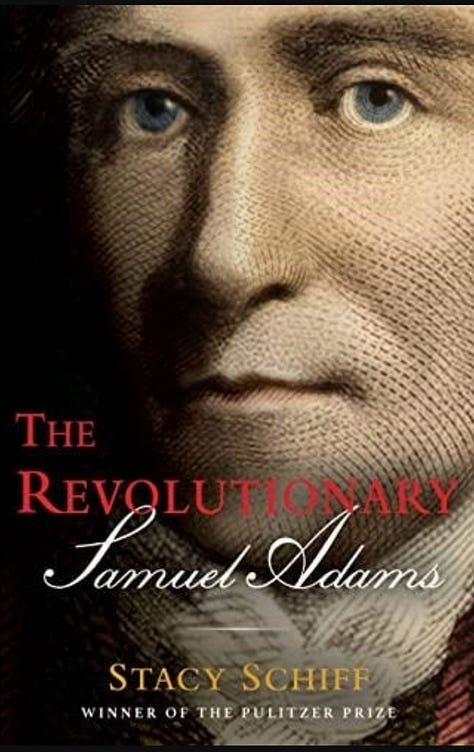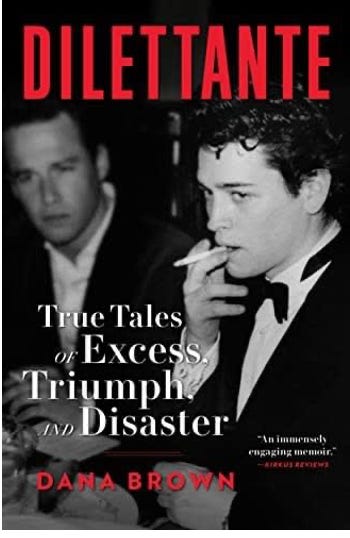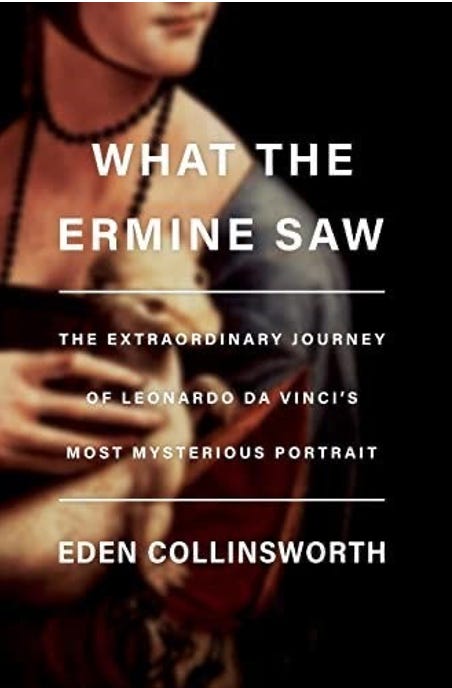We are pleased to announce the 2022 Octavian Best Book List, our annual selections for the best books we read this year. Best wishes for a happy, healthy and safe new year.
THE REVOLUTIONARY by Stacy Schiff
Pulitzer-Prize winning biographer Stacy Schiff returns with a magisterial biography of Samuel Adams, the man who in many ways has become the forgotten Founding Father. Long misunderstood as a violent radical, Schiff portrays him as he was: a visionary who came to revolution earlier than most, a man whose weapon was his pen, and who was the beating heart of the movement to his contemporaries. With this well-researched, elegantly-written volume, Schiff will likely return the elder Adams cousin to the place he rightfully deserves among the founders of this nation.
LINCOLN AND THE FIGHT FOR PEACE by John Avlon
Having tackled Washington’s Farewell Address, John Avlon turns his attention to Lincoln, the great wartime President whose plans for a lasting peace were cut short by an assassin’s bullet. As Avlon deftly shows, Lincoln had given great thought to and put in motion plans for a peace at once magnanimous but one that would also redress the horrendous wrongs of slavery. In a fascinating coda, he further elucidates the effect Lincoln’s vision for peacemaking had on future generations, most notably perhaps the one that rebuilt the world after the Second World War.
Today it is almost impossible to imagine that anyone would question the genius of Pablo Picasso and his work. But for decades, he was dismissed, particularly in the United States. In this remarkable book, Hugh Eakin traces the long-standing battle to gain acceptance for Picasso and for European modern art generally in the United States, focusing particularly on two figures without whom it would never have happened: the turn of the century lawyer John Quinn, the driving force behind the Armory Show, and Alfred Barr, the intellectual who was the founding director of the Museum of Modern Art. A must-read for anyone interested in the history of art or of how culture often eventually accepts those visionaries it initially does not understand.
MEGATHREATS by Nouriel Roubini
In this profoundly insightful but alarming book from Nouriel Roubini, the economist who predicted with stunning precision the financial crisis of 2008 warns about the multiple and interlocking megathreats we face today from overwhelming global debt balances to inflation to war to climate change and the looming possibility of stagflation. Known as “Dr. Doom” but preferring to be called “Dr. Realist,” Roubini offers a sobering analysis for anyone hoping to understanding the challenges we face today.









THE POWER OF CRISIS by Ian Bremmer
Renowned political scientist Ian Bremmer offers his take on the problems that current domestic and international tensions and dysfunction pose to solving what he views as three critical issues: meeting health crises like COVID, combating accelerating climate change, and addressing the massive technological shifts currently underway, particularly around artificial intelligence. In this punchy volume, Bremmer also offers a hopeful future where the very responses to these crises just might make the world a better and safer place.
PERSIANS by Lloyd Llewellyn Jones
We know the ancient Persians largely through the words of others, beginning with Herodotus and the Greeks who largely viewed them antagonistically. In this fascinating book, ancient historian Lloyd Llewellyn-Jones examines the Persian sources themselves and puts together a far more nuanced picture of their empire and its ruling family, the Achaemenids, who presided over a massive state that was centuries ahead of its contemporaries in tolerance and sophistication. It was, indeed, its founder Cyrus the Great, who allowed the Jews to return to Jerusalem after centuries of exile. Impeccably researched and briskly written.
THE FIFTH ACT by Elliot Ackerman
National Book Award finalist Elliot Ackerman returns with a heartfelt and penetrating memoir of his time in Afghanistan, of its meaning to a generation of veterans, and a reflection on its catastrophic end. In first-hand accounts of missions he led as a combat officer to his involvement as a civilian in high-stakes efforts to rescue Afghans and others during the Fall of Kabul in the summer of 2021, Ackerman offers a profound reflection on American strategy and on the military’s fundamental code that no one be left behind.
KLARA AND THE SUN by Kazuo Ishiguru
A powerful and poignant novel from Nobel-Prize winner Kazuo Ishiguru set in a dystopian, not-too-distant future. Our narrator is a robot whose job is to serve as a companion and baby-sitter for an adolescent girl in precarious health. Raising questions about artificial intelligence, what it means to be human, and where technology might take us, Klara and the Sun is also a beautiful story about growing up and those who help us do it. A beautiful work.
Cultural historian Mark Braude turns his attention to the tempestuous and productive relationship between two outsiders in Paris in the 1920s: the Brooklyn-born photographer Man Ray and his muse, the provincial girl who reinvented herself as Kiki de Montparnasse, one of the most central, now forgotten figures in the neighborhood that was the height of avant-garde culture. Surrounded by a supporting cast from Ernest Hemingway to Marcel Duchamp to the artists of the School of Paris, Kiki gets her rightful due in this fast-paced book that also tells the story of the creation of the most expensive photograph in the world: Man Ray’s picture of Kiki as the Violon d’Ingres.






THE WAR THAT MADE THE ROMAN EMPIRE by Barry Strauss
It’s not just because Actium was our namesake’s great triumph that we include renowned classicist Barry Strauss’s excellent book on our list. Strauss again displays his exceptional ability to describe ancient history for the general reader, making events read like a novel and historical figures come to life. Here, he turns his focus on to the final climactic naval battle between Octavian and the lovers and allies Mark Antony and Cleopatra which finally ended decades of civil war and ushered in the Roman Empire, whose legacy continues to influence and inform our own culture today.
In this truly funny memoir of his time as an editor at Vanity Fair for two decades under legendary editor Graydon Carter, Brown recalls a time now gone but certainly missed when the magazine business was the height of glamour and when expense accounts were an afterthought. From society scandal to Hollywood to Wall Street to the royals, Carter and his band defined the culture. Brown pulls no punches, naming names and telling hilarious anecdotes of the rich and famous he met, including the time he was forced to bar one Donald J. Trump from a party on which he was not on the guest list.
THE ADVENTURES OF HERBIE COHEN by Rich Cohen
A pioneer in studying and popularizing the art of negotiation, Cohen rose from modest roots to become a mega best-selling author and advisor on negotiating techniques to everyone from the FBI to Ronald Reagan to NFL players. He also was decades ahead of his time in maintaining a freelance career based on his own ideas and promotion. His son, bestselling-author Rich Cohen, tells his father’s story in his latest book which is absorbing for both its lessons on negotiation and the larger-than-life exploits of the man known as the World’s Greatest Negotiator.
MONSIEUR PROUST by Céleste Albaret
From the archives, we recommend the incomparable memoir by Céleste Albaret, Monsieur Proust, about her time as housekeeper and companion to Marcel Proust in the years when his health was failing him and he struggled to finish his masterpiece In Search of Lost Time. Whether you have conquered the great work or not, this intimate portrait of an genius at work, of the idosycracies of his life and habits against the backdrop of war and catastrophe is almost impossible to put down. It is, in its own way, a masterpiece.
WHAT THE ERMINE SAW by Eden Collinsworth
In this short, fast-paced and fascinating book, Eden Collinsworth traces the journey of one of Leonardo’s masterpieces – Woman with an Ermine – from its initial creation to its ownership by one of the great Polish aristocratic families to its seizure by the Nazis to its ultimate home today in Krakow, set against the backdrop of the great upheaveals in European society over several centuries. Along the way, she provides portraits of the Cecilia Gallerani, the teenager in the picture, of its collection of proprietors, and of course of the artist, Leonardo da Vinci himself.
MAKING DARKNESS LIGHT: A LIFE OF JOHN MILTON By Joe Moshenska
In this intensely personal biography of the great poet John Milton, Oxford-don Joe Moshenska offers in lucid and insightful prose a one-volume life of one of England’s greatest poets, second perhaps only to Shakespeare. A complicated man deeply immersed in the complicated politics of his times, which included the regicide of Charles I, Milton also produced some of the greatest works in English literature despite his incipient blindness, including his towering masterpiece Paradise Lost. Moshenska also makes the spirited case for why Milton is worth reading today and why he means so much to him personally.




Pretty sure the Jewish exile in Babylon didn’t last centuries. More like 60 years?